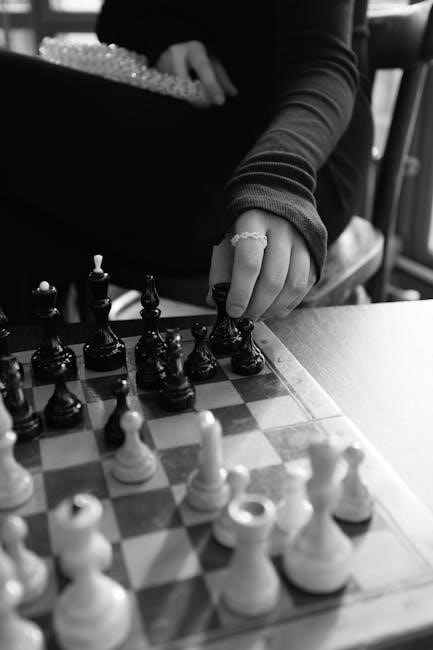The mental game of trading is a critical component of achieving success in the financial markets․ It encompasses the emotional, psychological, and behavioral aspects that influence a trader’s decisions and performance․ While technical analysis and strategy development are essential, the mental game plays a far more significant role in determining long-term success․ Research indicates that 90% of trading success is tied to emotional and psychological mastery, with only 10% attributed to technical skills; Jared Tendler’s work, particularly The Mental Game of Trading, highlights how emotions like fear, greed, and anger can undermine even the best strategies․ By addressing these challenges, traders can develop the resilience and discipline needed to thrive in the markets․

Importance
The mental game of trading plays a pivotal role in determining a trader’s success, often overshadowing technical skills and strategy․ As highlighted in Jared Tendler’s The Mental Game of Trading, the psychological and emotional challenges traders face are far more impactful than many realize․ Research suggests that 90% of trading success is attributed to emotional and psychological mastery, while only 10% is tied to technical knowledge․ This stark ratio underscores the importance of addressing the mental aspects of trading to achieve consistent profitability and long-term growth․
One of the most critical reasons for prioritizing the mental game is its direct influence on decision-making․ Emotions such as fear, greed, and anger can cloud judgment, leading to impulsive actions that undermine even the most well-planned strategies․ For example, fear of missing out (FOMO) may cause a trader to enter a position too late, while fear of losses might result in exiting a trade prematurely․ Similarly, overconfidence can lead to reckless risk-taking, exacerbating potential losses․ By mastering the mental game, traders can develop the emotional resilience needed to stick to their strategies and avoid costly mistakes․

Another key aspect is the psychological barriers that traders often encounter․ These barriers can manifest as recurring patterns of behavior, such as chasing price movements, cutting winners short, or overtrading․ Such habits are rarely addressed through technical analysis alone and require a deeper understanding of the underlying psychological drivers․ Tendler’s structured problem-solving approach, as outlined in his book, provides traders with practical tools to identify and correct these flaws․ By addressing these issues, traders can break free from limiting patterns and unlock their full potential․
The importance of discipline cannot be overstated․ Discipline is the backbone of successful trading, enabling traders to execute plans consistently and avoid emotional decision-making․ However, discipline is not just about following rules; it also involves cultivating mental clarity and emotional control․ Traders who master the mental game are better equipped to navigate the inherent uncertainties of the markets, staying focused on their goals even in the face of adversity․ This level of discipline is what separates amateur traders from professionals who consistently achieve profitable outcomes․

Finally, the mental game is essential for long-term sustainability in trading․ The markets are unpredictable, and traders face countless challenges, from sudden market reversals to prolonged losing streaks․ Without a strong mental foundation, these challenges can lead to burnout, frustration, and eventual failure․ By prioritizing the mental game, traders can build resilience, adapt to changing conditions, and maintain the motivation needed to stay in the game․ In essence, mastering the mental game is not just about improving trading performance—it’s about fostering personal growth and ensuring a lasting career in the markets․

Five-Step Process

The five-step process outlined in The Mental Game of Trading provides a structured approach to overcoming psychological and emotional challenges in trading․ First, traders identify specific problems impacting their performance․ Next, they analyze the flawed logic or beliefs driving these issues․ The third step involves developing practical corrections to address these flaws․ Fourth, traders practice implementing these corrections in real-time scenarios․ Finally, they maintain improvement by continuously monitoring progress and refining their strategies․ This systematic approach helps traders build resilience, discipline, and emotional control, ultimately enhancing their ability to execute trades effectively and consistently․
How It Works
The mental game of trading, as outlined in Jared Tendler’s The Mental Game of Trading, operates on the premise that traders must systematically identify, analyze, and correct the psychological and emotional flaws that hinder their performance․ This process is rooted in a structured, five-step methodology designed to help traders gain clarity over their mental and emotional challenges․ By breaking down complex issues into manageable parts, traders can develop the resilience and discipline needed to execute their strategies effectively, even in high-pressure situations․

At its core, the system emphasizes self-awareness and personal responsibility․ Traders are encouraged to recognize how their thoughts, emotions, and behaviors influence their decision-making․ For example, feelings of fear or greed often lead to impulsive actions, such as premature exits from profitable trades or overtrading․ By acknowledging these patterns, traders can begin to address the root causes of their mistakes․ The process also involves understanding how past experiences, unresolved insecurities, and personal biases shape trading behavior․ This deeper level of insight allows traders to develop targeted strategies for improvement;

One of the key components of the system is its focus on incremental progress․ Traders are not expected to overhaul their mental game overnight․ Instead, they are guided through a series of exercises and reflections designed to build confidence and emotional control over time․ For instance, traders might practice staying present during trades to avoid being swayed by negative emotions․ They might also learn to reframe their mindset, viewing losses as opportunities for growth rather than as personal failures․ This gradual approach helps traders develop the mental toughness required to navigate the unpredictable nature of the markets․

Another critical aspect of the system is its emphasis on practical application․ Traders are encouraged to apply the principles learned in real-world scenarios, using journaling and self-analysis to track their progress․ By documenting their thoughts, emotions, and actions during trades, traders can identify recurring patterns and refine their strategies accordingly․ This hands-on approach ensures that the lessons learned are not theoretical but deeply ingrained, leading to lasting improvement․
Ultimately, the mental game of trading is not about achieving perfection but about continually improving․ By systematically addressing flaws, managing emotions, and maintaining discipline, traders can unlock their full potential and achieve consistent results․ The five-step process outlined in Tendler’s work serves as a roadmap, guiding traders through the complex journey of mastering their mental and emotional challenges․ As traders progress, they gain not only better trading outcomes but also a deeper understanding of themselves, leading to personal and professional growth․